2016–present purges in Turkey
| 2016–present purges in Turkey | |||
|---|---|---|---|
| Part of Turkish government–Gülen movement conflict | |||
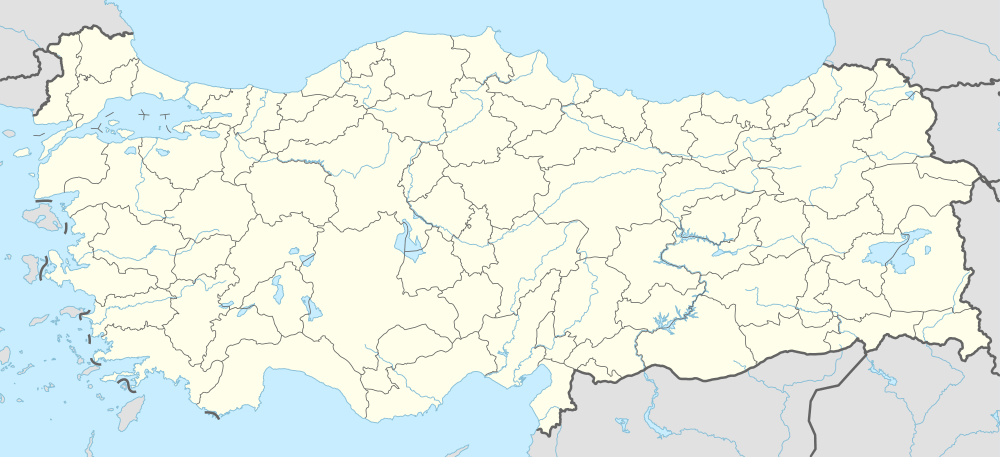 Ankara Istanbul 2016–present purges in Turkey (Turkey) | |||
| Date | 16 July 2016 – ongoing (disputed)[1][2][3][4] | ||
| Location | |||
| Status | |||
| Parties to the civil conflict | |||
| |||
| Lead figures | |||
|
| |||
| Units involved | |||
| |||
| Casualties | |||
| |||
The 2016–present purges in Turkey are an ongoing purges by the government of Turkey enabled by a state of emergency in reaction to the 15 July failed coup d'état.[1][2][3][4] After the immediate arrest of military personnel accused of making the coup attempt, arrests were expanded to include further elements of the Turkish military service, as well as various civil servants and private businesses. These later actions, reflecting a power struggle between secularist and Islamist political elites in Turkey,[18] which began to be known as a purge, affected people who were not active in nor aware of the coup as it happened, but who were alleged to be connected with the Gülen movement, a group which the government blames for the coup. Even the mere possession of books authored by Gülen may be considered evidence of such a connection and cause for arrest.[19]
Tens of thousands of public servants and soldiers were purged in the first week following the coup.[20] For example, on 16 July 2016, just one day after the coup was foiled, 2,745 judges were dismissed and detained.[21][22] This was followed by the dismissal, detention or suspension of over 100,000 officials,[23][24][25] a figure that had increased to over 110,000 by early November 2016,[26] over 125,000 after the 22 November decree,[27] reaching at least 135,000 with the 7 January's decrees, about 160,000 after 29 April 2017's suspensions and arrests decree[9] and 180,000 after July 8th 2018's massive dismissal decree. This make up about 10% of Turkey's 2 millions public employees[10].
In the business sector, the government forcefully seized assets of over 1000 companies worth between $11[28] and $50-60 billions,[29] on the charge of being related to Gulen and the coup.[28] By late 2017 over a thousand companies and their assets owned by individuals allegedly affiliated with the movement had been seized[30] and generally such things as goods produced by such companies had become boycotted by the public.[31]
The purges also extend to the media with television channels, newspapers and other media outlets that were seen as critical of the government being shut down, critical journalists being arrested and Wikipedia being blocked since April 2017.[32][33][34][35][36] Since early September 2016, the post-coup emergency state allowed a turn against Kurdish groups and Kurdish culture[37], most notably with the dismissal of about 12,000 Kurdish teachers and 24 elected mayors and arrest of the co-chairs of the Peoples' Democratic Party[38] for alleged links with the PKK.[39] In August 2018, the Turkish Parliament approved a new “anti-terror” law to replace the state of emergency.[40][41][42]
Background
In January 2014, during a major corruption inquiry in Turkey, 96 judges and prosecutors, including the chief prosecutor of İzmir, Huseyin Bas, were transferred to new locations, ending the investigations. Bas was transferred to Samsun. Altogether 120 judges and prosecutors were reassigned.[43] At the time, The Daily Telegraph described the events as "the biggest purge of the judiciary in [Turkey's] history".[44][45] From 2014 to mid-2016, repeated purges of civilian, military and judicial officials took place in Turkey, mainly aimed at followers of Fethullah Gülen, a former colleague of the Turkish President Recep Tayyip Erdoğan.[46]
Sectors affected
During the first post-coup speech Erdoğan could address to the nation upon landing at Atatürk airport, he said, "This uprising is a gift from God to us because this will be a reason to cleanse our army".[47][48][49]
An extensive purge of the Turkish civil service began with Erdoğan warning his opponents that "they will pay a heavy price for this."[50] The New York Times described the purges as a "counter-coup" and expected Erdoğan to "become more vengeful and obsessed with control than ever, exploiting the crisis not just to punish mutinous soldiers but to further quash whatever dissent is left in Turkey".[50]
On 18 July, U.S. Secretary of State John Kerry urged Turkish authorities to halt the increasing crackdown on its citizens, indicating that the crackdown was meant to "suppress dissent". French Foreign Minister and former Prime Minister Jean-Marc Ayrault voiced concern, warning against a "political system which turns away from democracy".[51]
The United Nations have been accused of being unresponsive against the purges,[52] while at the same time also failing to condemn the coup and resulting violence, due to disagreement between Egypt and other Security Council members on the wording of a resolution in that direction.[53]
Military
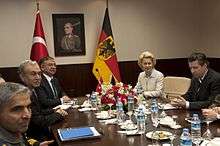
Prime Minister Binali Yıldırım announced on 16 July 2016 that 2,839 soldiers of various ranks had been arrested.[54] Among those arrested were at least 34 generals or admirals.[55] A number of students of the Kuleli Military High School, enough to fill five buses, were also arrested.[56] By 18 July 2016, a total of 103 generals and admirals have been detained by Turkish authorities in connection with the coup.[57][58]
Yasemin Özata Çetinkaya, the governor of Sinop Province, was removed from her duty and her husband, a colonel in the Turkish army, arrested.[59] Turkish military conducted a raid on the Turkish Air Force Academy in Istanbul as well.[60]
Major General Cahit Bakir, who commanded Turkish forces under NATO in Afghanistan, and Brigadier General Sener Topuc, responsible for education and aid in Afghanistan, have been detained by authorities in Dubai in connection with Turkey's failed coup.[61]
General Bekir Ercan Van, the commander of Incirlik Air Base, which the U.S. uses to carry out airstrikes against ISIL, was arrested by Turkish authorities for his alleged role in plotting the failed military coup. He sought asylum from the United States but was denied.[62]
Police and judiciary
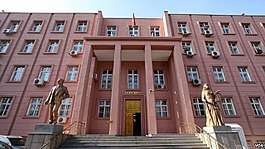
On 16 July 2016, the Supreme Board of Judges and Prosecutors of Turkey (HSYK) removed 2,745 Turkish judges from duty and ordered their detention.[21][22][63] Of these judges, 541 were in administrative judiciary and 2,204 were in criminal judiciary. This amounted to approximately 36% of all judges in Turkey at the time.[64] Two judges from the Constitutional Court of Turkey, Alparslan Altan and Erdal Tercan, were detained by Turkish authorities for supposed ties with the Gülen movement,[65] while 5 members of the HSYK had their membership revoked and 10 members of the Turkish Council of State were arrested on charges of being members of the parallel state.[66] Furthermore, arrest warrants were issued for 48 members of the Council of State and 140 members of the Court of Cassation.
By 18 July 2016, the Turkish government had suspended 8,777 government officials across the country for alleged links to the coup perpetrators. Among those suspended include 7,899 police officers, 614 gendarmerie officers, 47 district governors and 30 regional governors.[67] As of 19 July 2016, 755 judges and prosecutors had been arrested in relation to the coup attempt.[68]
Politics

Hüseyin Avni Mutlu, ex-governor of İstanbul, was dismissed on 19 July 2016.[69] Deputy Mayor of Istanbul's Şişli District, Cemil Candaş, was shot in the head in his office by an unidentified assailant on 18 July 2016. Meanwhile, Turkish parliament was evacuated due to unidentified security concerns.[70]
Starting in September, the purges pushed upon the largely Kurdish HDP political formation. Over 1,478 politically active kurds and 78 democratically-elected mayors have been jailed.[38] HDP coheads Selahattin Demirtas and Figen Yüksekdağ being jailed, with prosecutor seeking up to 142 and 83 years in jail for each, respectively. The main charge is the allegation of "managing a terrorist organization [(the HDP)]".[38]
Civil service
Following a series of arrests and purges throughout the government, Prime Minister Yıldırım announced on 18 July 2016 that annual leave for all civil servants was suspended, and all those on leave were to return to work. Over three million civil servants were affected. In addition, public sector employees were banned from leaving the country.[71]
By the evening of 19 July 2016, the number of public sector employees suspended had reached 49,321. In the Ministry of Finance, more than 1500 employees were suspended. In the Prime Ministry, 257 employees, including six advisers, were suspended. The Presidency of Religious Affairs suspended 492 employees, among them three provincial muftis. The numbers of suspended personnel in the National Intelligence Organization and Ministry of Family and Social Policy were 100 and 393 respectively.[72][73]
On 20 July 2016, the Youth and Sports Minister Akif Çağatay Kılıç announced that 245 personnel within his ministry had been laid off. The Energy Ministry reports 300 employees were let go, and the Customs Ministry indicated 184 employees were dismissed.[74]
Education

By far the greatest purge was in the Ministry of National Education, where 15,200 teachers were suspended. The licenses of 21,000 teachers in the private sector were also cancelled. The Council of Higher Education asked all deans of state and private universities, numbering 1577, to resign. 626 educational institutions, mostly private, were shut down.[75] For example, in Burdur, one school, one cram school and four student hostels were shut down on 20 July.[76] In addition, a travel ban was placed on academics, preventing them from leaving the country.[77]
On 23 July 2016, Erdoğan shut down 1,043 private schools, 1,229 charities and foundations, 19 trade unions, 15 universities and 35 medical institutions in his first emergency decree under the newly adopted emergency legislation.[78]
Media
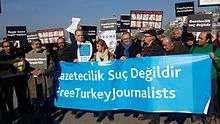
The licenses of 24 radio and television channels and the press cards of 34 journalists accused of being linked to Gülen were revoked.[79][80] Two people were arrested for praising the coup attempt and insulting Erdoğan on social media.[81] On 25 July, Nazlı Ilıcak was taken into custody.[82]
On 27 July 2016, Erdoğan shut down 16 television channels, 23 radio stations, 45 daily newspapers, 15 magazines and 29 publishing houses in another emergency decree under the newly adopted emergency legislation. The closed outlets notably include Gülen-affiliated Cihan News Agency, Samanyolu TV and the previously leading newspaper Zaman (including its English-language version Today's Zaman),[83] but also the opposition daily newspaper Taraf which was known to be in close relations with the Gulen Movement.[84]
In late October 2015, Turkish authorities shut down 15 media outlets, including one of the world’s only women’s news agencies, and detained the editor-in-chief of the prominent secularist Turkish newspaper Cumhuriyet, "on accusations that they committed crimes on behalf of Kurdish militants and a network linked to the US-based cleric Fethullah Gülen".[85]
Turkey has imprisoned more than 160 journalists,[86] making it the world's biggest jailer of journalists.[87] In May 2018, at a press conference with British PM Theresa May, Turkish President Erdoğan called Turkey's jailed journalists "terrorists".[86]
Traveling
Government authorities had revoked almost 11,000 passports by 22 July;[88] by 30 July, more than 50,000 passports were cancelled.[89]
Extradition
In August 2016 Erdoğan gave the United States an ultimatum, demanding the extradition of Fethullah Gülen, the cleric believed to be behind the failed 15 July coup attempt.[90][91] Turkey demanded that Greece extradite eight Turkish soldiers who had fled there after the coup.[92] On 11 August 2016, Bulgaria extradited Abdullah Büyük, a Turkish businessman being linked with the Gülen movement.[93]
Purges by numbers
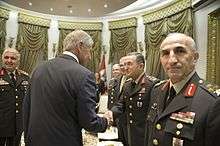
Initial purges
The bulk of the purges happened in the 10 days following the coup. The government releasing data documenting the issue :
Later purges, mass suspensions and mass arrests
On 17 August 2016, the government dismissed 2,300 more officers from the police force, 136 military officers and 196 employees from the information technology authority.[94]
On 18 August 2016, arrest warrants were issued for 187 suspects, including CEOs of leading companies in Turkey, with prosecutors also ordering the seizure of their assets.[95]
On 2 September 2016, Turkey announced a purge of about 11,500 teachers with alleged links to PKK. The move was denounced by Kurdish and Turkish opposition parties for lacking due process and evidences. An anonymous former Turkish diplomat said the move sharply weakened the pacifist wing of Kurdish voices, pushing the Kurdish movement toward more radical means.[39]
On 12 September 2016, Turkey removed two dozen elected mayors, members of the opposition Peoples' Democratic Party (HDP), for alleged links to Kurdish militants.[96]

On 4 October 2016, Turkish authorities suspend nearly 12,800 more police officers from duty over their suspected links with U.S.-based cleric Fethullah Gulen.[97]
On 29 October 2016, by decree, Turkey dismissed 10,131 more civil servants, while about 15 more media outlets were closed for alleged ties to terrorist organizations and cleric Fethullah Gülen.[98][99]
In early November 2016, security forces began mass arrests of opposition Peoples' Democratic Party (HDP) MPs, including co-leaders Selahattin Demirtaş and Figen Yüksekdağ. Internet and social web services were blocked across southeastern Turkey.[100][101] Out of 59 HDP's MPs, 15 were researched, 12 MPs were detained, 2 MPs were travelling abroad, and one not located.[102]
On 22 November 2016, a decree announced 15,726 dismissals (security forces: 7,600, ministry of interior: 2,700, education: 1,200).[103]
People were affected for being “related, belonging to or in contact with terror organizations and structures that are considered by the National Security Council as acting against national security.”[27] Passports of these affected people were canceled.[27]
With this decree 550 associations, 9 medias, and 19 private medical structures have been closed.[103]
The financial assets and properties of those organizations were to be seized by the Turkish Treasury.[27]
On 12 December 2016, in reaction to prior Istanbul double bombing and Kurdistan Freedom Falcons (TAK) claims, 118 HDP officials and supporters were arrested.[104]
On 21 December 2016, Turkey suspended another 1,980 teachers and school employees for alleged connections to the coup attempt.[105]
On 25 December 2016, Turkey probes around 10,000 social media users for allegedly insulting government officials or supporting "terror-related activity."[106]
On 7 January 2017, and via three decrees, 8,390 more civil servants were dismissed (2,687 police officers, 1,699 civil servants from the justice ministry, 838 health officials, and hundreds others from other ministries, 631 academics, 8 members of the Council of State).[107]
In early February 2017, the Turkish government dismissed more than 4,400 public servants from their jobs,[108] including over 300 university teachers.[109]
On 14 February 2017, the Turkish government arrested 834 people with alleged links with PKK. The mass arrest has been linked to the constitutional referendum, to which most Kurdish factions are opposed.[110]
After the April 16 referendum, 38 activists denouncing irregularities were detained.[111]
On 26 April 2017, 1009 police officers were accused of being a secret Gulenist network within the Turkish police force, and were detained.[111] 9,100 policemen have been suspended[112]
On 29 April 2017, Turkey blocked Wikipedia and dismissed 3,974 more civil servants.[9] The NYT qualified the move as "an expand[ing] crackdown on dissent and free expression".[113]
On 5 June, the Turkish interior ministry announces that 130 people, living outside the country and suspected of militant links, will lose their citizenship unless they return to Turkey within three months and meet government standards. Named suspects include U.S.-based cleric Fethullah Gülen, and Peoples' Democratic Party leaders Faysal Sariyildiz, Tuğba Hezer, and Özdal Üçer. (Reuters)
15 June 2017, UN Mechanism for International Criminal Tribunals judge Aydin Sedaf Akay was sentenced to 71⁄2 years on charges of "membership in [to the Gulen movement, itself] a terrorist organization", despite Mr. Akay having diplomatic immunity due to his position at the UN MICT.[114]
On 15 July, 7,400 more police were dismissed.[115]
On December 24, 2017, a decree announce the dismissal of 2,700 public officers.[116][117]
On July 8, 2018, right before Erdogan new presidency with enlarged executive powers and the promised end of the state of emergency, 18,632 public officiers were dismissed by decree.[118] Among them, 9,000+ are police officers, 6,000+ are members of the Turkish military,[118] +1000 are from judiciary,[119] about 650 are teachers and about 200 academics.[120] Three newspapers, one TV channel and 12 associations were also shut down.[120]
On July 25, 2018, Turkey passed new anti-terrorism bill to replace emergency rule.[40] According to the Human Rights Watch, the new law "will allow authorities under the presidency, for the next three years, to dismiss judges and all other public officials arbitrarily. It also would allow the authorities to restrict movement within Turkey, ban public assemblies, and allow police to hold some suspects for up to 12 days without charge and repeatedly detain them in the same investigation."[121] CHP parliamentary group leader Özgür Özel said that "With this bill, with the measures in this text, the state of emergency will not be extended for three months but for three years. They make it look like they are lifting the emergency, but in fact they are continuing it."[41]
On August 14, 2018, Turkish police arrested another German citizen on terrorism-related charges. German authorities said nine German nationals are currently in detention in Turkey for "political reasons."[122]
Human rights
Human rights in Turkey are governed by international law treaties, including the International Covenant on Civil and Political Rights that Turkey signed in 2000, that take precedence over Turkish legislation according to Article 90 of the 1982 Constitution.[123] After protesters chanted for reintroduction of the death penalty,[124] abolished by Turkey in 2004, Erdoğan stated that this was a possibility that would be discussed in parliament, and that in a democracy, the will of the people must be respected.[125][126] On 21 July, the Turkish government announced that it would suspend the European Convention on Human Rights during a temporary state of emergency.[127]
On 24 July 2016, Amnesty International called for the European Committee for the Prevention of Torture to make an emergency visit to Turkey to observe the conditions in which the detainees were held.[128]
Identification methods
Johannes Hahn, the European Commissioner dealing with Turkey's bid to become a member state of the European Union (EU), said that it appears Turkey's government had prepared arrest lists of political opponents before the coup attempt and had been waiting for the right time to act.[129] The usage of social medias monitoring is suspected.
Anonymous-and-paid denunciations are officially declared as the main source for identifying suspects. Most of the over 140 thousands people affected by the purges were affected following denounciations by coworkers and other citizens.[130] The system have been legalized via a 31 August 2015's decree by the Ministry of interior.[130] The rewarded anonymous denounciation's grid is public and online, divided in 5 category according to the threat, and pointing to major suspects, mainly Kurds, then Gulenist, then Islamists (ISIS).[130]
Detainees' conditions
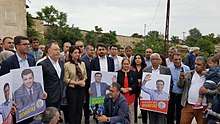
According to Amnesty International, during the July 2016 purges, detainees were denied food for up to three days and water for up to two days, were denied medical treatment, were reportedly raped with police truncheons or fingers, and were subjected to other forms of torture.[128] Amnesty said that three hundred male soldiers held in the Ankara police headquarters were beaten during their detention, with injuries including bruises, cuts and broken bones. Forty soldiers were unable to walk because of their injuries, and two were unable to stand.[128] Amnesty also said that detainees' shirts were covered in blood during their interrogations by prosecutors and that detainees during the purges were mostly prevented from contacting their families and lawyers.[128]
Given overcrowded conditions, the Turkish government published a decree on 16 August announcing that 38,000 inmates whose criminal offense pre-dated 1 July were now eligible for sentence reduction.[131] Inmates with two years or less to serve are eligible, while inmates who have served half of their sentence can ask for parole. The decree applies to crimes committed before 1 July 2016, excluding convictions for murder, domestic violence, sexual abuse, terrorism or crimes against the state.[131]
Arrest of human rights activists
Turkish human rights lawyer Orhan Kemal Cengiz was detained for three days in July 2016. He was "provisionally released" and remains subject to a travel ban.[132][133] Serdar Kuni, a doctor from Cizre, who assisted the respected Human Rights Foundation in documenting violations in the town, and arrested on poorly defined charges of "being a member of a terrorist organization" for treating injured locals.[134]
On 6 June 2017, Taner Kılıç, the Chair of Amnesty International Turkey, and another 22 lawyers were detained in İzmir by the Turkish police on the suspicion of having links with the Fethullah Gülen movement and later charged with "membership of a terrorist organisation". The detention and prosecution was condemned by Amnesty International and Human Rights Watch who asked for his immediate release. Hugh Williamson, Europe and Central Asia director at Human Rights Watch, stated that "detaining Kılıç on suspicion of terrorist offenses looks like a tactic aimed at discrediting his legitimate human rights work."[135][136][137]
International school closures
About 1,000 Gülen movement schools exist worldwide, with 300 of them in Turkey. Turkey requested closure of affiliated schools in 50 countries.[138]
- Somalia closed the Gülen affiliated schools.[139]
- Azerbaijan closed 13 education centres, 11 high schools, and also Qafqaz University associated with Gülen movement.[140][141]
- Pakistan : Turkey requested closure of Gülen movement schools.[142]
- Sudan closed Gülen movement schools by Turkish request.[143]
Reactions
The purges were criticized by Western governments and human rights groups. Human Rights Watch warned the Turkish government against "[using] the coup attempt to justify a witch-hunt against those it regards as opponents".[46] Andrew Gardner, Amnesty International's researcher for Turkey, said: "We are witnessing a crackdown of exceptional proportions in Turkey at the moment. While it is understandable, and legitimate, that the government wishes to investigate and punish those responsible for this bloody coup attempt, they must abide by the rule of law and respect freedom of expression."[144]
Conversely, the purges were praised by Judicial Commission of Indonesia chairman Aidul Fitriciada Azhari. Azhari pointed to the purges as a positive example of external oversight of a judicial system and the exercise of executive power by a judicial commission, referring to the Supreme Board of Judges and Prosecutors.[145]
Effect on Turkey's EU accession bid
Johannes Hahn, the European Commissioner dealing with Turkey's bid to become a member state of the European Union (EU), said that it appeared Turkey's government had prepared arrest lists of political opponents before the coup attempt and had been waiting for the right time to act.[129] EU High Representative of the Union for Foreign Affairs and Security Policy Federica Mogherini condemned the purges, saying: "What we're seeing especially in the fields of universities, media, the judiciary, is unacceptable."[146]
Horst Seehofer, the minister-president of Bavaria, urged the EU to suspend Turkey's accession negotiations: "If one sees how Turkey is dismantling the rule of law... then these (EU membership) negotiations must be stopped immediately. No democratic constitutional state acts like this."[147]
On 22 November 2016 the European Parliament voted 497 to 37 in favour of a non binding freeze on membership talks with Turkey in response to "disproportionate repressive measures taken in Turkey since the failed military coup attempt."[148]
University associations
The Czech University Council compared the purges of educational institutions in Turkey to events which took place under Communist dictatorship in former Czechoslovakia.[149]
The European University Association (EUA) joined by the European University Foundations (EUF) “strongly and unconditionally” condemned the forced resignation of hundreds of deans from higher education institutions in Turkey in the wake of the failed coup attempt in the country, and called on all European governments, universities and scholars to speak out against these developments and to support democracy in Turkey, including institutional autonomy and academic freedom for scholars and students.[150][151][152]
Europe

.jpg)
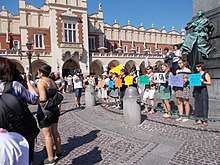
Belgian Foreign Minister Didier Reynders said Turkish authorities' reaction to the failed coup needed to be "proportionate," and that he was alarmed by the arrests of judges and calls for reinstatement of the death penalty against coup participants.[153]
French Foreign Minister Jean-Marc Ayrault voiced concern, warning against a "political system which turns away from democracy" in response to the purges.[51]
United States
U.S. President Barack Obama said he was concerned by pictures showing the rough treatment of some of the arrested coup plotters, some of whom appeared stripped to their underwear and handcuffed behind their backs.[154] U.S. Secretary of State John Kerry urged Turkish authorities to halt the crackdown on its citizens, expressing concern that the aim of the crackdown was to "suppress dissent."[51]
The commander of U.S. Central Command, General Joseph Votel, said that several of the U.S. military’s closest partners in the Turkish military have been jailed.[155] In response, Erdoğan accused Votel of being on the side of coup plotters.[156] On 29 July, Votel said in a statement: "Any reporting that I had anything to do with the recent unsuccessful coup attempt in Turkey is unfortunate and completely inaccurate. ... We appreciate Turkey's continuing cooperation and look forward to our future partnership in the counter-ISIL fight."[157]
On August 1, 2018, President Donald Trump's administration sanctioned two top Turkish government officials, Turkish Justice Minister Abdulhamit Gül and Interior Minister Suleyman Soylu, over the detention of American pastor Andrew Brunson.[158][159] The indictment alleged that American pastor had ties with Gülen's network.[159] Daniel Glaser, the former Assistant Secretary for Terrorist Financing under President Barack Obama, said: "It’s certainly the first time I can think of" the U.S. sanctioning a NATO ally. "I certainly regard it as a human rights violation to unlawfully detain somebody, so I think it falls within the scope of the Global Magnitsky Act."[160]
United Nations
In July 2016, the U.S., with the support of Britain, drafted language for the United Nations Security Council that would have expressed grave concern over the situation, called upon on all parties to "respect the democratically elected government of Turkey" and the rule of law, and urged the parties to show restraint and avoid violence. However, Egypt blocked the proposed statement.[161] Egyptian diplomats argued that the Council is "in no position to qualify, or label [the Turkish] government – or any other government for that matter – as democratically elected or not". Objection by the United States and the UK – permanent members of the Security Council – led to Egypt proposing a new statement calling for all sides to "respect the democratic and constitutional principles and the rule of law", which was rejected, preventing the condemnation of the coup attempt by the Security Council.[161]
In August 2016, United Nations High Commissioner for Human Rights Zeid Ra'ad Al Hussein decried the purge. Zeid said that while he opposed the coup attempt, the wide-ranging purge showed a "thirst for revenge" that was alarming.[162] Later that month, a group of experts in the Office of the High Commissioner for Human Rights issued a joint statement saying that the purges may violate international law,[163] specifically Turkey's obligations under the International Covenant on Civil and Political Rights.[164] The statement said: "While we understand the sense of crisis in Turkey, we are concerned that the government's steps to limit a broad range of human rights guarantees go beyond what can be justified in light of the current situation. Turkey is going through a critical period. Derogation measures must not be used in a way that will push the country deeper into crisis."[163]
In March 2018 Office of the United Nations High Commissioner for Human Rights issued a report on the impact of the state of emergency on human rights in Turkey. The report indicates interference of the executive with the work of the judiciary and curtailment of parliamentary oversight over the executive branch of government; arbitrary mass dismissals of civil servants and private sector employees; arbitrary closure of civil society organizations, including prominent human rights NGOs and media; arbitrary detention of people arrested under state of emergency measures; the use of torture and ill-treatment during pre-trial detention; restrictions of the rights to freedoms of expression and of movement; arbitrary expropriation of private property; and methods of collective punishment targeting family members of individuals suspected of offences under the state of emergency. OHCHR noted with concern that the routine extensions of the state of emergency may lead to an enduring system of governing characterized by a large number of arbitrary decisions that profoundly affect the lives of many individuals and families. [165]
Analysis
Can Dündar, Editor-in-chief of the Turkish daily Cumhuriyet, described the purges as part of a historical pattern of political power in Turkey shifting back and forth between the secular military versus religious institutions, with democrats in the middle having little power to prevent the repeated oscillations, but worse than previous cycles. He described the 2016 purges as "the biggest witch-hunt in Turkey's history".[166] Historians and analysts including Henri J. Barkey, Director of the Middle East Program of the Woodrow Wilson International Center for Scholars, compared the 2016 Turkish purges to Mao Zedong's Cultural Revolution that started in 1966 and the Iranian Cultural Revolution in which Iranian academia was purged during 1980–1987.[167] The government of Turkey has been analysed to blame Western forces and raise anti-Americanism in order to distract the public from real intranational tensions, as well as to take an upper ground for negotiations.[168][169][170] According to the New York Times, "Searching for historical parallels, analysts have made comparisons with Joseph McCarthy’s anti-Communist witch hunt in 1950s America, the Stalinist purges of the 1930s and the Cultural Revolution in China in the 1960s and ’70s."[23] Other comparisons have been made with Hitler's use of the Reichstag fire to consolidate his power, and with Atatürk's use of the 1926 assassination plot on his life to purge Turkey of his political opponents and rivals.[171]
See also
References
- 1 2 "Turkey's State Of Emergency Ends, While Erdogan's Power Grows And 'Purge' Continues". NPR. 26 July 2018.
- 1 2 "Turkey ends state of emergency, but eyes tough terror bill". Deutsche Welle. 19 August 2018.
- 1 2 "Turkey Ends Emergency Rule But Erdogan's War on Enemies Not Over". Bloomberg. 18 July 2018.
- 1 2 "Turkey ends state of emergency but continues crackdown". EUobserver. 19 July 2018.
- ↑ "Turkey elections: Six arrested for 'insulting Erdogan' on social media ahead of major national polls". The Independent. 24 June 2018.
- ↑ "Turkey orders detention of 132 people in coup probe: agency". Reuters. 26 June 2018.
- ↑ "Turkey arrests German for spreading Kurdish propaganda: Anadolu". Reuters. 25 July 2018.
- ↑ "The Latest: Parliament speaker says lawmakers safe". Associated Press. 15 July 2016. Retrieved 15 July 2016.
- 1 2 3 Pamuk, Humeyra; Gurses, Ercan (29 April 2017). "Turkey fires 3,900 in second post-referendum purge". Thomson Reuters. Archived from the original on 23 November 2017. Retrieved 24 November 2017.
- 1 2 OECD (2012), Human Resources Management Country Profiles TURKEY (PDF)
- ↑ "Erdogan back in Ankara as thousands hit by Turkey purge". guardian.ng. Guardian Newspapers. AFP. 20 July 2016. Retrieved 18 August 2016.
- ↑ "240 Turkey's regime supporters killed in failed coup attempt". kuna.net.kw. Istanbul: Kuwait News Agency. 19 July 2016. Retrieved 18 August 2016.
- ↑ "Military says 8,651 soldiers participated in Turkey's coup attempt". Hürriyet Daily News. Ankara. Retrieved 7 August 2016.
- ↑ "Turkey left reeling after failed coup". The Nubian Times. 20 July 2016. Retrieved 18 August 2016.
- ↑ "208 people killed by coup attempters: Turkey's PM". Hürriet Daily News. Ankara. Retrieved 18 August 2016.
- ↑ "MEB'te 15 bin kişi açığa alındı, 21 bin öğretmenin lisansı iptal" (in Turkish). NTV (Turkey). Retrieved 19 July 2016.
- ↑ "Turkey says 103 generals, admirals detained after Turkey's failed coup attempt". Hürriet Daily News. 18 July 2016. Retrieved 18 August 2016.
- ↑ Metin Gurcan (12 October 2016). "Power struggle erupts in Turkey's security structure". Al-Monitor. Archived from the original on 30 October 2016. Retrieved 29 October 2016.
- ↑ "Babasının evinde Gülen'in kitapları çıktı" [Gülen's books turned up at his father's house]. Haber10. 13 August 2016. Retrieved 5 August 2017.
- ↑ "The Scale of Turkey's Purge Is Nearly Unprecedented". The New York Times. 2 August 2016. Retrieved 7 August 2016.
- 1 2 Frazer, Susan; Dominique, Soguel (16 July 2016). "Turkey quashes coup; Erdogan vows 'heavy price' for plotters". Austin American-Statesman/AP. Archived from the original on 16 July 2016. Retrieved 16 July 2016.
- 1 2 "Turkey's top judicial board HSYK orders detention of 2,745 Gülen-linked judges over coup attempt". dailysabah.com. Retrieved 16 July 2016.
- 1 2 "Turks See Purge as Witch Hunt of 'Medieval' Darkness". The New York Times. 16 September 2016.
- ↑ "Turkey launches mass raids against 'Gulen-linked' businesses". ABC News. 18 August 2016.
- ↑ Sariyuce, Isil; Dewan, Angela (20 July 2016). "Turkey declares three-month state of emergency". CNN.com. Retrieved 21 July 2016.
- ↑ "Turkey draws Western condemnation over arrest of Kurdish lawmakers". Reuters. 4 November 2016. Retrieved 4 November 2016.
- 1 2 3 4 NORDLAND, Rod; TIMUR, Safak (22 November 2016), 15,000 More Public Workers Are Fired in Turkey Crackdown
- 1 2 By David Segal (2017-07-22). "Turkey Sees Foes at Work in Gold Mines, Cafes and 'Smurf Village' - NYTimes.com". Mobile.nytimes.com. Retrieved 2017-10-18.
- ↑ Perrier, Guillaume (2018-06-22). "Les patrons turcs victimes de la purge d'Erdogan". LesEchos.fr.
- ↑ "Turkish state appoints trustees to Aydınlı Group, baklava chain Faruk Güllüoğlu - BUSINESS". Hurriyetdailynews.com. 2011-09-13. Retrieved 2017-10-18.
- ↑ 4:23 PM ET (2017-08-03). "Turkish Businesses Snagged In Government's Post-Coup Crackdown : Parallels". NPR. Retrieved 2017-10-18.
- ↑ Letsch, Constanze (31 October 2016). "Turkey shuts 15 media outlets and arrests opposition editor". The Guardian. Retrieved 1 May 2017.
- ↑ "Counting the closures: Turkey's media shutdown". Al Jazeera. Retrieved 1 May 2017.
- ↑ Yeginsu, Ceylan (27 July 2016). "Turkey Expands Purge, Shutting Down News Media Outlets". The New York Times. Retrieved 1 May 2017.
- ↑ Kingsley, Patrick (30 April 2017). "Turkey Purges 4,000 More Officials, and Blocks Wikipedia". The New York Times. Retrieved 1 May 2017.
- ↑ "Turkey blocks Wikipedia under law designed to protect national security". The Guardian. 29 April 2017. Retrieved 1 May 2017.
- ↑ KINGSLEY, PATRICK (2017), Amid Turkey’s Purge, a Renewed Attack on Kurdish Culture
- 1 2 3 Bulut, Uzay (1 February 2017), Turkish Jails: Packed with Kurds, Only Seven Members of ISIS
- 1 2 Kurds become new target of Ankara’s post-coup purges, 2016
- 1 2 "Turkey parliament approves new anti-terror law". Al-Jazeera. 25 July 2018.
- 1 2 "Turkey set to end state of emergency, replace it with harsh new 'anti-terrorism' legislation". The Japan Times. 18 July 2018.
- ↑ "Turkey approves new 'anti-terror' law to replace state of emergency". The Times of Israel. 25 July 2018.
- ↑ Butler, Daren; Tattersall, Nick (22 January 2014). "Turkish judicial purge brings corruption investigation to halt". Thomson Reuters. Archived from the original on 18 July 2016. Retrieved 18 July 2016.
- ↑ Shirlock, Ruth (22 January 2014). "Turkey continues with huge purge of judges and police". The Daily Telegraph. Archived from the original on 18 July 2016. Retrieved 18 July 2016.
- ↑ Butler, Daren; Toksabay, Ece (16 January 2014). "Turkish prosecutors removed as judicial purge intensifies". Thomson Reuters. Archived from the original on 18 July 2016. Retrieved 18 July 2016.
- 1 2 "Turkey: Protect Rights, Law After Coup Attempt". Human Rights Watch. 18 July 2016. Archived from the original on 19 July 2016. Retrieved 19 July 2016.
- ↑ Champion, Marc. "Coup Was 'Gift From God' for Erdogan Planning a New Turkey". Bloomberg.com. Retrieved 21 July 2016.
- ↑ Kingsley, Patrick (17 July 2016). "Turkey detains 6,000 over coup attempt as Erdoğan vows to 'clean state of virus'". the Guardian. Retrieved 21 July 2016.
- ↑ "Turkey rounds up plot suspects after thwarting coup against Erdogan". Reuters. 17 July 2016. Retrieved 17 September 2016.
- 1 2 "The Counter-Coup in Turkey". New York Times. 16 July 2016. Archived from the original on 16 July 2016. Retrieved 16 July 2016.
- 1 2 3 Robinson, Duncan; Srivastava, Mehul (18 July 2016). "US and EU leaders warn Turkey's Erdogan over post-coup crackdown". Financial Times. Retrieved 18 July 2016.
- ↑ "UN Human Rights Bodies Silent on Turkey's Massive Crackdown". 19 July 2016. Retrieved 21 July 2016.
- ↑ "Egypt blocks UN statement on Turkey after failed coup attempt". ABC News. 16 July 2016. Retrieved 21 July 2016.
- ↑ "Başbakan Yıldırım'dan açıklama: Kalkışma bastırıldı, 161 şehit var". NTV. Retrieved 16 July 2016.
- ↑ "Darbe girişiminde 34 general ve amiral gözaltında". Hürriyet. Retrieved 16 July 2016.
- ↑ "Kuleli Askeri Lisesine düzenlenen operasyon tamamlandı". Anadolu Agency. Retrieved 16 July 2016.
- ↑ "Turkey dismisses 9,000 officials after failed coup". Al Arabiya English. 18 July 2016. Retrieved 18 July 2016.
- ↑ "Turkey urged to protect rule of law". RTÉ. 18 July 2016. Retrieved 18 July 2016.
- ↑ "Darbe girişimiyle ilgili 140 Yargıtay ve 48 Danıştay üyesi hakkında gözaltı kararı". T24. Retrieved 16 July 2016.
- ↑ "Turkey coup attempt: Police and officials purged". BBC. 18 July 2016. Retrieved 18 July 2016.
- ↑ "Two Afghan-based Turkish generals detained in Dubai after failed coup: CNN Turk". Reuters. 26 July 2016.
- ↑ "Erdogan Triumphs After Coup Attempt, but Turkey's Fate Is Unclear". The New York Times. 17 July 2016.
- ↑ Dolan, David (16 July 2016). MacSwan, Angus, ed. "Turkey removes more than 2,700 judges following coup attempt". Reuters. Retrieved 16 July 2016.
- ↑ "TÜRKİYE GENELİ HAKİM VE CUMHURİYET SAVCISI KADRO DURUMU" (PDF) (in Turkish). hsyk.gov.tr. Archived from the original (PDF) on 27 October 2011. Retrieved 16 July 2016.
- ↑ "Gülen-linked Constitutional Court members Altan, Tercan detained after failed coup attempt". Daily Sabah. 16 July 2016. Retrieved 18 July 2016.
- ↑ "HSYK, 2 bin 745 hakimi açığa aldı; 5 kişinin üyeliğini düşürdü!" (in Turkish). T24. Retrieved 16 July 2016.
- ↑ "Interior Ministry suspends 8,777 officials in wake of Turkey's failed coup attempt". Hürriyet Daily News. 18 July 2016. Retrieved 18 July 2016.
- ↑ "Turkey's post-coup purge reaches 20,000". Deutsche Welle. 18 July 2016. Archived from the original on 18 July 2016. Retrieved 19 July 2016.
- ↑ "Hüseyin Avni Mutlu görevden uzaklaştırıldı". Cumhuriyet. 19 July 2016. Retrieved 19 July 2016.
- ↑ Withnall, Andy (18 July 2016). "Turkey parliament 'evacuated due to imminent security threat'". The Independent. Retrieved 18 July 2016.
- ↑ Osborne, Samuel (18 July 2016). "Turkey coup: PM suspends annual leave for over three million civil servants". The Independent. Retrieved 18 July 2016.
- ↑ "Cumhuriyet tarihinin en büyük operasyonu; kamuda 49 bin 321 kişi görevden alındı". T24. Retrieved 19 July 2016.
- ↑ Finkel, Isobel (19 July 2016). "Turkey Extends Purge to Universities, Asking All Deans to Go". Bloomberg. Retrieved 19 July 2016.
- ↑ "Turkish parliament dismisses eight executives as crackdown on Gülenists continues" (in Turkish). Retrieved 20 July 2016.
- ↑ "Turkey shuts 626 educational institutions -Turkish official". news.trust.org. Istanbul: Thomson Reuters Foundation. 20 July 2016. Retrieved 20 July 2016.
- ↑ "Burdur'da FETÖ/PDY'ye yakınlığıyla bilinen bir özel okul, 4 pansiyon ve bir dershane mühürlendi" (in Turkish). CNN Türk. Retrieved 20 July 2016.
- ↑ Shaheen, Kareem (20 July 2016). "Erdoğan declares three-month state of emergency in Turkey". The Guardian. Retrieved 20 July 2016.
- ↑ Jones, Gareth; Gurses, Ercan (23 July 2016). "Turkey's Erdogan shuts schools, charities in first state of emergency decree". Reuters. Retrieved 23 July 2016.
- ↑ "34 gazetecinin basın kartı iptal edildi" [34 journalists' press cards were revoked]. T24.com.tr (in Turkish). Retrieved 19 July 2016.
- ↑ Williams, Nathan (19 July 2016). "Turkey coup: Purge widens to education sector". BBC. Retrieved 19 July 2016.
- ↑ Karaman; Zonguldak (20 July 2016). "Two arrested in Turkey for praising failed coup attempt on social media". Hürriyet Daily News. Retrieved 20 July 2016.
- ↑ "Nazlı Ilıcak için gözaltı kararı" [Detention Order for Nazli Ilıcak] (in Turkish). CNN Türk. Retrieved 25 July 2016.
- ↑ Jones, Gareth; Gurses, Ercan (28 July 2016). "Turkey shuts scores of media outlets, sacks generals". Al Jazeera. Retrieved 28 July 2016.
- ↑ "Turkish generals resign as government prepares to overhaul armed forces". The Guardian. AFP. 28 July 2016. Retrieved 28 July 2016.
- ↑ "Turkey shuts 15 media outlets and arrests opposition editor". The Guardian. 31 October 2016. Retrieved 31 October 2016.
- 1 2 "Erdoğan ends UK state visit by calling jailed journalists 'terrorists'". The Guardian. 15 May 2018.
- ↑ "Number of Jailed Journalists Hits Record High, Advocacy Group Says". The New York Times. 13 December 2017.
- ↑ "Turkish Authorities Revoke 11,000 Passports in Wake of Failed Coup". Sputnik News. Moscow. Sputnik. 22 July 2016. Retrieved 22 July 2016.
- ↑ Dearden, Lizzie (31 July 2016). "Turkey coup attempt: Government cancels 50,000 passports as global concern grows over crackdown". The Independent. Retrieved 31 July 2016.
- ↑ "Turkey's Erdogan to US: Hand over exiled cleric Gulen". CNN. 11 August 2016.
- ↑ "Turkey officials to demand extradition of Fethullah Gülen from US". theguardian.com. Retrieved 13 August 2016.
- ↑ "Turkey ups pressure on Greece to extradite soldiers who fled there after failed coup". euronews.com. Retrieved 13 August 2016.
- ↑ "Controversy continues over Bulgaria's deportation of Büyük to Turkey". Sofia Globe. 12 August 2016.
- ↑ Fraser, Suzan (2016), Turkey to release 38,000 from jail; frees space for plotters, AP
- ↑ "Turkey launches mass raids against 'Gulen-linked' businesses", ABC, 18 August 2016. Accessed 24 August 2016.
- ↑ Turkey removes two dozen elected mayors in Kurdish militant crackdown, Reuters, 12 September 2016
- ↑ Turkey suspends 13,000 police officers, shuts down TV station, Reuters, retrieved 18 October 2017
- ↑ "Purges en Turquie : plus de 10 000 fonctionnaires supplémentaires limogés". 30 October 2016. Retrieved 22 December 2016 – via Le Monde.
- ↑ "Turkey sacks 10,000 more civil servants, shuts media in latest crackdown". 30 October 2016. Retrieved 22 December 2016 – via Reuters.
- ↑ Shaheen, Kareem (4 November 2016). "Turkey arrests pro-Kurdish party leaders amid claims of internet shutdown". Retrieved 22 December 2016 – via The Guardian.
- ↑ "Turkey HDP: Blast after pro-Kurdish leaders Demirtas and Yuksekdag detained". 4 November 2016. Retrieved 22 December 2016 – via www.bbc.co.uk.
- ↑ "US, EU Question Turkey's Detention of Pro-Kurdish Lawmakers". Associated Press. 4 November 2016. Retrieved 22 December 2016 – via The New York Times.
- 1 2 "Plus de 15 000 fonctionnaires supplémentaires limogés en Turquie". 22 November 2016. Retrieved 22 December 2016 – via Le Monde.
- ↑ Turkey detains more than 100 in raids against pro-Kurdish party: state media
- ↑ "Turkey suspends another 2,000 education staff for alleged links to failed coup". 21 December 2016 – via Reuters.
- ↑ "Turkey targets 10,000 social media users in 'terror' probe". 24 December 2016 – via www.bbc.com.
- ↑ Williams, Stuart (7 January 2017), Turkey dismisses over 8,000 in new wave of post-coup purges, AFP
- ↑ Turkey dismisses 4,400 public servants in latest post-coup attempt purge, The Guardian
- ↑ Hurtas, Sibel; Utku Bila (translator), Sibel (13 February 2017). "The collapse of Turkish academia". Al-Monitor (Turkey Pulse). Retrieved 17 February 2017.
- ↑ Turkey: Hundreds detained over alleged links to PKK, 14 February 2017
- 1 2 Over 1,000 Police Officers Are Detained in Raids in Turkey https://nyti.ms/2q5RvG2
- ↑ "Purges en Turquie : plus de 9 000 policiers suspendus". Lemonde.fr. Retrieved 2017-10-18.
- ↑ Kingsley, Patrick (30 April 2017), Turkey Purges 4,000 More Officials, and Blocks Wikipedia
- ↑ "Turkey sentences U.N. war crimes judge on 'terrorism' charges: Hague". Reuters. 15 June 2017. Retrieved 16 June 2017.
- ↑ Dearden, Lizzie, Turkey dismisses 7,400 more police, soldiers and public sector workers a year after failed coup
- ↑ agency, AFP news. "Turkey dismisses over 2,700 in post-coup purges u.afp.com/4tMN".
- ↑ Turkey sacks 2,700 public workers in latest purge http://f24.my/2HLD.T via @FRANCE24
- 1 2 Turkey fires thousands of state employees in anti-terrorism purge https://www.theguardian.com/world/2018/jul/08/turkey-fires-thousands-of-public-servants-in-anti-terror-purge
- ↑ https://www.marianne.net/monde/la-purge-d-erdogan-continue-en-turquie-plus-de-18-000-fonctionnaires-limoges
- 1 2 Turkey purges more than 18,000 civil servants in latest decree https://www.bloomberg.com/news/articles/2018-07-08/turkey-purges-more-than-18-000-civil-servants-in-latest-decree
- ↑ "Turkey: Normalizing the State of Emergency". Human Rights Watch. 20 July 2018.
- ↑ "Turkey arrests another German citizen". Deutsche Welle. 16 August 2018.
- ↑ Arat, Zehra F. Kabasakal (1 January 2011). "Human Rights in Turkey". University of Pennsylvania Press. p. 253 – via Google Books.
- ↑ Mackey, Robert (21 July 2016). "Donald Trump Crams Two Errors Into One Statement on Turkey". theintercept.com. The Intercept. Retrieved 24 July 2016.
It was revulsion at these massacres that prompted calls for Turkey to reintroduce the death penalty to deal with the guilty soldiers, and gave Erdogan popular support for the sweeping arrest of thousands accused of sympathizing with the coup plotters.
- ↑ "Turkey coup attempt: Erdogan signals death penalty return – BBC News". Retrieved 21 July 2016.
- ↑ "Erdogan says Turkey will consider reinstating death penalty". Retrieved 21 July 2016.
- ↑ "Turkey to temporarily suspend European Convention on Human Rights after coup attempt". Retrieved 21 July 2016.
- 1 2 3 4 "Turkey: Independent monitors must be allowed to access detainees amid torture allegations". Amnesty International. 24 July 2016. Archived from the original on 24 July 2016. Retrieved 24 July 2016.
- 1 2 "Turkey coup attempt: Government had list of arrests prepared before rebellion, EU commissioner says". The Independent. 19 July 2016.
- 1 2 3 Dénoncer les « terroristes » peut rapporter gros en Turquie http://www.lemonde.fr/international/article/2017/10/23/denoncer-les-terroristes-peut-rapporter-gros-en-turquie_5204825_3210.html
- 1 2 Press, Associated (17 August 2016). "Turkey to free 38,000 people from prisons to make space for alleged coup plotters" – via The Guardian.
- ↑ Sinclair-Webb, Emma (22 July 2016). "Dispatches: Turkey's State of Emergency". Human Rights Watch. Archived from the original on 24 July 2016. Retrieved 24 July 2016.
- ↑ Turkey: Provisional release of Mr. Orhan Kemal Cengiz and travel ban against him, World Organisation Against Torture (26 July 2016).
- ↑ Mehta, Christine (29 May 2017), A Doctor’s Trial in a Turkish Border Town
- ↑ "Turkey: Imprisonment of Amnesty Chair is a devastating injustice". Amnesty International. 9 June 2017. Retrieved 16 June 2017.
- ↑ "Turkey: Release Amnesty International Official". Human Rights Watch. 8 June 2017. Retrieved 16 June 2017.
- ↑ "Chair of Amnesty International Turkey swept up in post-coup purge". Amnesty International. 6 June 2017. Retrieved 16 June 2017.
- ↑ Yalçin, Zübeyde (28 July 2016). "Turkey calls 50 countries to close Gülenist schools". Daily Sabah. Istanbul. Retrieved 13 August 2016.
- ↑ Sheikh Nor, Mohamed (18 July 2016). "Somalia Shuts Schools Linked to Turkish Cleric After Failed Coup". Bloomberg.com. Retrieved 18 August 2016.
- ↑ Safarova, Durna (20 July 2016). "Azerbaijan: University, Paper Closed as Anti-Gülen Cleanup Continues". Eurasianet.org. Retrieved 13 August 2016.
- ↑ "Gülen-affiliated university closed in Azerbaijan". Daily Sabah. Baku. Andolu Agency. 21 July 2016. Retrieved 13 August 2016.
- ↑ "Turkey asks Pakistan to shut down Gulen-run schools". Business Standard. Islamabad. IANS. 2 August 2016. Retrieved 13 August 2016.
- ↑ Younis, Ahmed (6 August 2016). "Sudan Closes Gulen Schools in Response to Turkish Government's Request". Asharq Al-Awsat. Retrieved 13 August 2016.
- ↑ "Turkey: Media purge threatens freedom of expression". Amnesty International. 20 July 2016.
- ↑ Supreme Court urged to accept oversight to ensure reform. Jakarta Post, 23 July 2016. Accessed 7 November 2016.
- ↑ "Erdogan announces army overhaul in latest post-coup shakeup". Reuters.com. 22 July 2016.
- ↑ "Merkel ally urges EU to suspend Turkey accession talks over purge". Reuters. 22 July 2016.
- ↑ "Majority of European Parliament votes to freeze EU membership talks with Turkey". dw.com. 24 November 2016.
- ↑ "Deputy PM seeks government motion over purge of education sector in Turkey". Radio Prague. 22 July 2016.
- ↑ "EUA Statement condemning the forced resignation of 1577 university deans". Retrieved 25 July 2016.
- ↑ "Turkey purge: EUA condemns move on university deans Hundreds of deans have been ordered to resign while academics have been told not to travel abroad for work in the wake of the failed coup". timeshighereducation.com. 20 July 2016. Retrieved 25 July 2016.
- ↑ "Statement condemning the forced resignation of university deans in Turkey". Retrieved 25 July 2016.
- ↑ Osborne, Samuel; Mortimer, Caroline (18 July 2016). "Turkey coup: World leaders call for 'restraint and moderation' as Erdoğan continues purge". Independent. Retrieved 25 July 2016.
- ↑ "Turkey coup attempt: World leaders warn Erdoğan not to use uprising as excuse for crackdown as more than 6,000 arrested". The Telegraph. 18 July 2016. Retrieved 25 July 2016.
- ↑ "Pentagon Allies Jailed in Turkey Amid Coup Backlash, General Says". The Wall Street Journal. 28 July 2016.
- ↑ "Turkey's Erdogan to drop lawsuits against people who insulted him". BBC News. 29 July 2016.
- ↑ "U.S. general denies involvement in Turkish coup attempt". Reuters. 29 July 2016.
- ↑ "Andrew Brunson, U.S. Pastor, Moved to House Arrest in Turkey". The New York Times. 25 June 2018.
- 1 2 "Turkey's Dangerous Game of 'Hostage Diplomacy'". The Atlantic. 6 May 2018.
- ↑ "US sanctions Turkish officials over detained pastor". Politico. 1 August 2018.
- 1 2 Michelle Nichols, Egypt blocks U.N. call to respect 'democratically elected' government in Turkey, Reuters (16 July 2016).
- ↑ Stephanie Nebehay, U.N. rights boss decries purge in Turkey, voices concerns on China, Reuters (10 August 2016).
- 1 2 Lizzie Dearden, Turkey coup attempt: UN warns Erdogan government purges could violate international law after 40,000 detained, The Independent (19 August 2016).
- ↑ UN experts press Turkey to adhere to human rights obligations despite state of emergency, UN News Center (19 August 2016).
- ↑ Report on the impact of the state of emergency on human rights in Turkey, including an update on the South-East
- ↑ Dündar, Can (22 July 2016). "This is the biggest witch-hunt in Turkey's history". The Guardian. Archived from the original on 22 July 2016. Retrieved 22 July 2016.
- ↑ Hubbard, Ben; Arango, Tim; Yeginsu, Ceylan (22 July 2016). "Failed Turkish Coup Accelerated a Purge Years in the Making". The New York Times. Retrieved 22 July 2016.
- ↑ "Turkey's New Anti-Americanism". The New York Times. 4 August 2016. Retrieved 7 August 2016.
- ↑ "Erdogan Says West Supports Terrorism". Associated Press. 2 August 2016. Retrieved 7 August 2016 – via The New York Times.
- ↑ "Turks Can Agree on One Thing: U.S. Was Behind Failed Coup". The New York Times. 3 August 2016. Retrieved 7 August 2016.
- ↑ Stefan Ihrig, Measured Terror, History Today, Volume 67 Issue 2 February 2017
External links
- Reality Check: The numbers behind the crackdown in Turkey, BBC, 18 June 2018
- https://turkeypurge.com/ - multi-lingual (including English) detailed documentation of the purges